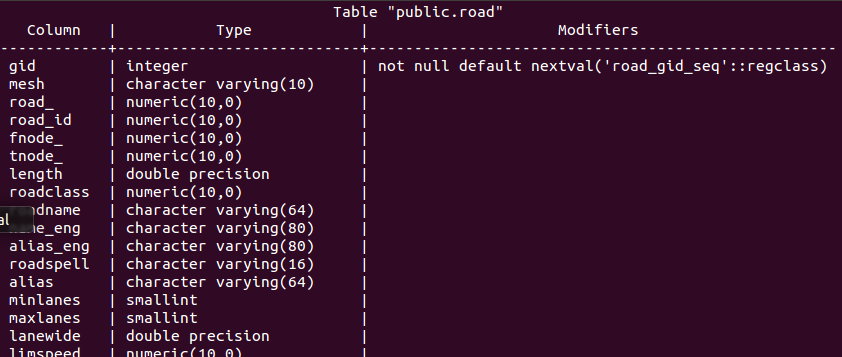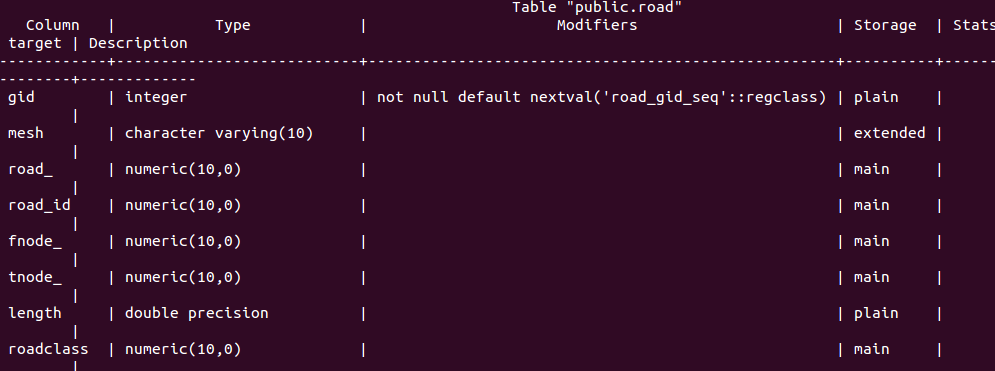postgreSql 基本操作总结
0. 启动pgsl数据库
pg_ctl -D /xx/pgdata start
1. 命令行登录数据库
|
1
|
psql -U username -d dbname -h hostip -p port |
2. 列出所有数据库
\l
3. 切换数据库
|
1
|
\c dbname |
4. 列出当前数据库的所有表
\d
5. 查看指定表的所有字段
|
1
|
\d tablename |

6. 查看指定表的基本情况
|
1
|
\d+ tablename |

7. 退出操作
|
1
|
q |
8. 新建表
例1(主键)
create table TESTCASE( id INTEGER, task_class INTEGER, age TEXT, PRIMARY KEY(id, task_class) );
例2(自增SERIAL)
create table CREATETASK_CHKID_N(
id SERIAL PRIMARY KEY,
chk_id TEXT,
n INTEGER
);
其中SERIAL代表自增,默认从1开始增加,每次自增1。
9. 删除表
|
1
|
drop table REL_CROSS_NODE; |
10. 清空表
delete from [表名]
or
TRUNCATE TABLE [表名]
区别:Truncate table 表名 (注:不带where语句) 速度快,而且效率高。
因为DELETE 语句每次删除一行,并在事务日志中为所删除的每行记录一项。TRUNCATE TABLE 通过释放存储表数据所用的数据页来删除数据,并且只在事务日志中记录页的释放
11. 添加字段
|
1
|
alter table [表名] add column [字段名] [类型]; |
12. 更改字段
alter table [表名] rename column [旧字段名] to [新字段名]; 例:把表table_ex字段col_1限制非空去掉:ALTER TABLE table_eg ALTER col_1 drop not NULL
12.1 更改字段属性,含空格
如果把字段colname把属性Text转化为int,原来text里面存在空啥的,可以
ALTER TABLE tablename ALTER COLUMN colname TYPE int USING (trim(colname)::integer);
12.2 更改字段由int4-->int8
alter table test_data alter column task_id type bigint using task_id::bigint
13. 删除字段
|
1
|
alter table [表名] drop column [字段名]; |
14. 表中插入一行数据
|
1
|
insert into [表名] (字段1,字段2) values (值1,值2); |
例如:
|
1
|
insert into assist_info (id, maat_id, block_type) values ('F006', 'F7775', 1) |
注:
- 如果表中字段有大写的字段,则需要对应的加上双引号。例:insert into test (no, "Name") values ('123', 'jihite');
- 值用单引号引起来(''),不能用双引号("")
15. 表中删除一行数据
|
1
|
delete from [表名] where [该行特征]; |
16. 修改表中数据
|
1
|
update [表名] set [目标字段名]=[目标值] where [该行特征] |
17. 删除表
|
1
|
drop table [表名]; |
18. 退出postgreSql
\q
19. 两个查询结果做差 except
|
1
2
3
4
5
|
(select node_id from node where node_id=1 or node_id=2) except (select node_id from node where node_id=1); node_id--------- 2(1 row) |
20. 复制表
CREATE TABLE test_a_copy AS SELECT * FROM test_a;
21.命令导入sql数据文件
psql -h localhost -d databaseName -U username -f filename
22. 查询结果存储到输出文件
格式:
\o file_path
这样就会把查询结果存储到输出文件中。例
postgres=> \o /home/jihite/data/iu_data; postgres=> select test_id from cdb_all_iu_data limit 10; postgres=> select test_id from cdb_all_iu_data limit 5;
结果
test_id
--------------
2143
2153
2144
2156
2145
2154
2146
2157
2147
2155
(10 rows)
test_id
--------------
2143
2153
2144
2156
2145
(5 rows)
23. 数据库的备份&恢复
导出到线下文件
pg_dump --host hostname --port port --username username -t tablename -d dbname >/home/jihite/table.sql
把线下文件导入到数据库
psql -h 10.125.7.68 -p 5432 -d postgres -U postgres -W postgres -f 2.sql
24. \x
postgres=> \x
Expanded display is on.
postgres=> select * from cdb_chk_items where chk_id = 'R000000335';
-[ RECORD 1 ]+------------------------------------------------------------------------------------------------
chk_id | R000000335
chk_desc | 道路属性与道路属性相关检查
chk_info | {"FIELDS": {"TRAFFIC_SIGN": ["TYPE", "GEOM"], "ROAD_LINK": ["ROAD_CLASS", "FORM_WAY", "GEOM"]}}
err_desc | {"ERR2": "roadclass取值错误", "ERR1": "formway取值错误"}
chk_level | 1
is_opened | 1
module_name | TRAFFIC_SIGN
invalid_flag | 1
rel_mode | MAIN_LAYER:TRAFFIC_SIGN
: TRAFFIC_SIGN|A,M|DIRECT
: ROAD_LINK|A,M,D|ATTR_REL
25. 从表A中把符合条件的记录拷贝到表B
insert into A select * from B where id in ('a', 'b', 'c');
26 建立索引
单字段索引
CREATE INDEX index_name ON table_name (field1);
多字段索引
CREATE INDEX index_name ON table_name (field1,field2);
查看所有表的索引使用情况
select
relname, indexrelname, idx_scan, idx_tup_read, idx_tup_fetch
from
pg_stat_user_indexes
order by
idx_scan asc, idx_tup_read asc, idx_tup_fetch asc;
查看某个表索引的使用情况
select
relname, indexrelname, idx_scan, idx_tup_read, idx_tup_fetch
from
pg_stat_user_indexes
where
relname = table_name
order by
idx_scan asc, idx_tup_read asc, idx_tup_fetch asc;
27. 超找数据库的连接信息
select * from pg_stat_activity
包含:客户端user、ip、执行语句,状态、时间






